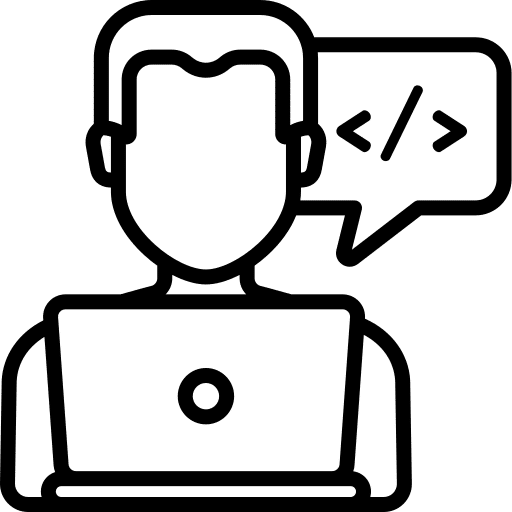Your Vision. Our Code. We Deliver.
We are the next-gen solution provider and you will experience the unstoppable technological growth while traveling with us. Our dedication to your success will be evident throughout the collaboration.

We are the next-gen solution provider and you will experience the unstoppable technological growth while traveling with us. Our dedication to your success will be evident throughout the collaboration.
UI/UX development refers to the process of designing and creating user interfaces (UI) and user experiences (UX) for websites, mobile applications, and other digital products. UI/UX development aims to enhance the overall usability, accessibility, and satisfaction of users interacting with a digital product.
Web development refers to the process of building and maintaining websites or web applications. It encompasses a variety of tasks and disciplines that contribute to the creation of a functional and visually appealing website. Web development can involve both the front-end and back-end aspects of a website, as well as the server-side configuration.
Salesforce is a cloud-based customer relationship management (CRM) platform that provides a suite of tools and services for businesses to manage and analyze customer interactions and data throughout the customer lifecycle. Salesforce is one of the leading CRM platforms globally, offering a wide range of features to help organizations streamline their sales, marketing, customer service, and overall business operations.
iOS development refers to the process of creating applications (apps) that run on Apple's iOS operating system. iOS is the mobile operating system that powers Apple's iPhone, iPad, and iPod Touch devices. Developers use various programming languages, frameworks, and tools to build iOS applications, which can be distributed through the Apple App Store.
Android development refers to the process of creating applications (apps) for devices running the Android operating system. Android is an open-source mobile operating system developed by Google, and it is widely used on a variety of devices, including smartphones, tablets, smart TVs, and other smart devices. Android development involves using specific programming languages, frameworks, and tools to build applications that can be distributed through the Google Play Store.
Cross-platform development refers to the creation of software applications that can run on multiple operating systems or platforms. In the context of mobile and web development, cross-platform development allows developers to write code once and deploy it across various platforms, such as iOS, Android, and the web, without the need to rewrite the code for each specific platform.
Wearable app development refers to the process of creating applications specifically designed to run on wearable devices. Wearable devices are smart electronic devices that can be worn on the body, often as accessories or embedded into clothing. These devices can include smartwatches, fitness trackers, augmented reality glasses, and other types of wearables. Wearable apps are developed to provide a tailored and optimized user experience on these devices.
"Custom apps" refer to software applications that are developed specifically for a particular organization, business, or user to address their unique needs and requirements. These applications are tailored to meet specific functionalities, workflows, and business processes that are not adequately addressed by off-the-shelf or pre-built software solutions.
QA is a set of processes, activities, and methodologies used in the software development lifecycle to ensure that a product or application meets specified quality standards. The primary goal of QA is to identify and address issues early in the development process, ultimately delivering a high-quality and reliable software product.
Support and maintenance in software refer to the ongoing activities and services provided after the initial development and deployment of a software application. These services are essential to ensure the smooth operation of the software, address issues promptly, and adapt the software to changing requirements or environments.
DevOps, a combination of "development" and "operations," is a set of practices, principles, and cultural philosophies that aim to improve collaboration and communication between software development teams (Dev) and IT operations teams (Ops). The primary goal of DevOps is to enhance the efficiency, speed, and quality of software delivery, ultimately leading to better business outcomes.
Dedicated developers typically refers to a model of hiring or collaboration where software developers work exclusively on a specific project or for a particular client. In this arrangement, the developers are assigned to a single project or client for an extended period, and their focus is entirely dedicated to the success of that project.

Choose dedicated developers

Integrate Team into
Your Projects

Scale On-demand
Artificial Intelligence (AI) and Machine Learning (ML) development involves building intelligent systems that can learn from data, adapt to new information, and make decisions with minimal human intervention. These technologies power innovations like chatbots, recommendation engines, predictive analytics, and autonomous systems, helping businesses automate processes, gain insights, and enhance user experiences.
E-Commerce Development refers to the process of creating and maintaining online platforms that allow businesses to sell products or services over the internet. It involves designing and building user-friendly websites or applications equipped with features like product catalogs, shopping carts, secure payment gateways, order processing, and customer account management.
This development process typically includes front-end and back-end programming, database setup, API integrations, mobile responsiveness, and performance optimization. E-commerce development can be done using platforms like Shopify, Magento, WooCommerce, or through custom-built solutions tailored to specific business needs.
The goal of e-commerce development is to create a seamless, secure, and engaging shopping experience that drives conversions, improves customer satisfaction, and enables businesses to operate efficiently in the digital marketplace.
Software Development is the process of designing, creating, testing, and maintaining computer programs or applications that perform specific tasks or solve particular problems. It involves a combination of planning, programming, coding, documenting, and deploying software systems for use across web, mobile, desktop, or cloud platforms.
This process typically includes requirements analysis, UI/UX design, development (frontend and backend), database setup, integration with other systems (via APIs), quality assurance testing, and ongoing support and maintenance. Software development can range from building simple mobile apps to complex enterprise systems and cloud-based applications.
The primary goal of software development is to deliver reliable, scalable, and efficient digital solutions that meet user needs, improve operational efficiency, and drive innovation within businesses and organizations.
Hospitality & Leisure refers to the process of designing, developing, and maintaining digital platforms that help hotels, resorts, restaurants, travel companies, and entertainment providers deliver seamless guest experiences. It involves building user-friendly websites, mobile apps, and booking systems equipped with features like online reservations, digital check-ins, event scheduling, payment processing, and customer relationship management.
This development process typically includes front-end and back-end programming, database management, third-party integrations (such as OTA platforms, POS systems, and payment gateways), mobile responsiveness, and performance optimization. Hospitality & Leisure solutions can be built on platforms like WordPress, custom booking engines, or fully tailored software to meet unique operational requirements.
The goal of hospitality and leisure development is to provide a frictionless, personalized, and engaging guest journey — from discovery to post-stay — that boosts occupancy rates, improves customer loyalty, and streamlines operations for service providers.
Health & Fitness development refers to creating and managing digital platforms that help individuals, gyms, fitness studios, healthcare providers, and wellness brands offer seamless experiences to their users. It involves building websites, mobile apps, and portals with features like class scheduling, membership management, workout tracking, telehealth consultations, e-commerce for supplements and gear, and secure payment systems.
This development process typically includes front-end and back-end programming, database setup, wearable device integrations, API connections (for fitness trackers, payment gateways, and telehealth platforms), mobile responsiveness, and performance optimization. Health & Fitness solutions can be built on popular CMS platforms, fitness management software, or custom-built applications tailored to your specific business needs.
The goal of health and fitness development is to deliver engaging, personalized, and accessible experiences that motivate users, improve health outcomes, and streamline business operations for gyms, trainers, and wellness providers.
Real Estate development refers to the process of creating and maintaining digital platforms that enable property owners, realtors, brokers, and real estate agencies to showcase properties, manage leads, and facilitate transactions online. It involves building websites, mobile apps, and property listing portals with features like advanced search filters, interactive maps, virtual tours, lead capture forms, and secure payment or booking systems.
This development process typically includes front-end and back-end programming, database management for property listings, CRM integration, third-party API connections (MLS/IDX data, payment gateways, and mapping services), mobile responsiveness, and performance optimization. Real estate solutions can be built using platforms like WordPress, custom-built property management systems, or enterprise-grade real estate portals tailored to your specific business needs.
The goal of real estate development is to create a seamless, visually appealing, and user-friendly experience that helps buyers, sellers, and agents connect effectively, improves lead conversion rates, and streamlines property management processes.
On-Demand development refers to building digital platforms and mobile applications that connect users with services, products, or professionals in real time. This includes creating solutions for ride-hailing, food delivery, home services, healthcare, logistics, and more — enabling customers to request services instantly and businesses to fulfill them efficiently.
The development process typically includes intuitive front-end design, powerful back-end infrastructure, real-time GPS tracking, secure payment gateways, push notifications, and third-party API integrations. On-demand solutions can be developed as standalone mobile apps or web-based platforms tailored to your specific business model.
The goal of on-demand development is to provide a smooth, fast, and reliable user experience that matches customer expectations for convenience while giving businesses complete visibility and control over operations.
Ready-to-Use solutions refer to pre-built, fully functional digital platforms that can be quickly customized and deployed for businesses across industries. These solutions come with essential features, integrations, and workflows already in place, reducing development time and allowing businesses to launch faster.
This approach typically includes pre-designed front-end interfaces, robust back-end architecture, database setup, payment gateway integration, and scalability for future growth. Ready-to-Use solutions can be tailored to match your brand identity, business requirements, and operational workflows — offering the perfect balance between speed and flexibility.
The goal of Ready-to-Use solutions is to minimize time-to-market, reduce development costs, and give businesses a reliable platform to start operating immediately without compromising on quality or performance.
CRM (Customer Relationship Management) & ERP (Enterprise Resource Planning) development refers to building systems that help businesses manage customer relationships, streamline internal processes, and improve operational efficiency. These platforms provide centralized data, automation, and analytics — empowering businesses to make smarter decisions and deliver better experiences.
The development process typically includes custom module design, database architecture, API integrations, workflow automation, role-based access control, reporting tools, and cloud deployment. CRM/ERP solutions can be developed from scratch or customized from existing platforms like Salesforce, Zoho, Odoo, or Microsoft Dynamics — depending on the business requirements.
The goal of CRM/ERP development is to create a unified platform that simplifies business operations, enhances collaboration across departments, and drives growth through data-driven insights and automation.
Social & Networking
Social & Networking development refers to creating digital platforms and mobile apps that connect people, foster communities, and enable content sharing, communication, and collaboration. These platforms can include social media apps, community forums, dating apps, professional networks, and niche-interest groups — designed to engage users and keep them connected.
The development process typically includes intuitive front-end design, scalable back-end infrastructure, real-time chat and notifications, media sharing capabilities, user profile management, and robust privacy controls. Social & Networking solutions can be built as custom mobile applications, web platforms, or hybrid solutions with features tailored to your audience and growth goals.
The goal of social and networking development is to deliver an interactive, engaging, and secure environment that encourages user participation, drives community growth, and helps businesses build meaningful digital connections.
Service We Provide